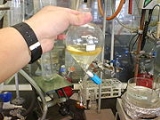
Partition coefficient
Overview
Chemistry
Chemistry is the science of matter, especially its chemical reactions, but also its composition, structure and properties. Chemistry is concerned with atoms and their interactions with other atoms, and particularly with the properties of chemical bonds....
and the pharmaceutical sciences
Pharmaceutical sciences
The pharmaceutical sciences are a group of interdisciplinary areas of study involved with the design, action, delivery, disposition, and use of drugs...
, a partition- (P) or distribution coefficient (D) is the ratio of concentration
Concentration
In chemistry, concentration is defined as the abundance of a constituent divided by the total volume of a mixture. Four types can be distinguished: mass concentration, molar concentration, number concentration, and volume concentration...
s of a compound
Chemical compound
A chemical compound is a pure chemical substance consisting of two or more different chemical elements that can be separated into simpler substances by chemical reactions. Chemical compounds have a unique and defined chemical structure; they consist of a fixed ratio of atoms that are held together...
in the two phases of a mixture of two immiscible solvent
Solvent
A solvent is a liquid, solid, or gas that dissolves another solid, liquid, or gaseous solute, resulting in a solution that is soluble in a certain volume of solvent at a specified temperature...
s at equilibrium
Partition equilibrium
The most common chemical equilibrium systems involve reactants and products in the same phase - either all gases or all solutions. However, it is also possible to get equilibria between substances in different phases, such as two liquids that do not mix...
. The terms "gas/liquid partition coefficient" and "air/water partition coefficient" are sometimes used for dimensionless forms of the Henry's law
Henry's law
In physics, Henry's law is one of the gas laws formulated by William Henry in 1803. It states that:An equivalent way of stating the law is that the solubility of a gas in a liquid at a particular temperature is proportional to the pressure of that gas above the liquid...
constant. Hence these coefficients are a measure of differential solubility
Solubility
Solubility is the property of a solid, liquid, or gaseous chemical substance called solute to dissolve in a solid, liquid, or gaseous solvent to form a homogeneous solution of the solute in the solvent. The solubility of a substance fundamentally depends on the used solvent as well as on...
of the compound between these two solvents.
Unanswered Questions

